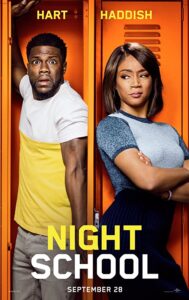A scatological cartoon, “Night School” nonetheless tickles the low brow funny bone.

 It should come as no surprise that “Night School” is another irreverent comedy helmed by Malcolm D. Lee, who gave us the funny and remarkably impactful 2017 hit “Girls Trip.” That film launched the career of the indomitable comedic force that is Tiffany Haddish. And despite Kevin Hart’s looming presence and domination of the otherwise inane narrative, Haddish is the soul of the film, and that’s a really good thing.
It should come as no surprise that “Night School” is another irreverent comedy helmed by Malcolm D. Lee, who gave us the funny and remarkably impactful 2017 hit “Girls Trip.” That film launched the career of the indomitable comedic force that is Tiffany Haddish. And despite Kevin Hart’s looming presence and domination of the otherwise inane narrative, Haddish is the soul of the film, and that’s a really good thing.
Any question whether the diminutive comedian Kevin Hart had difficulty making fun of himself is answered in “Night School,” in which he’s constantly diminished and ridiculed. Hart is so utterly clueless in this film that it is almost a revelation. He plays Teddy Walker, an arrogant fast-talker, who masks his learning disabilities with an endless sarcastic stream of jokes. It’s that approach that keeps him from completing high school. And years later, after making his mark as a top salesman of outdoor barbecue grills, he realizes that in order to advance his career, he has to get his general education diploma (GED). This means a trip to night school is in order.

Once enrolled in an evening GED program, Teddy encounters his old high school nemesis, Stewart Paterson (Taran Killam), who is now the school principal. Luckily for Teddy, the night school teacher, Carrie (Tiffany Haddish), is having none of Stewart’s authoritarian nonsense. But just because Carrie cares about education and teaching, doesn’t mean that Teddy is going to sail by on his smooth talking personality. And the other night school students feature an eclectic assortment of characters that might further frustrate his educational goals.
Really a staging ground for a series of extended slapstick gags and a continuous flow of one liners, the talented cast carries “Night School” despite the cartoonish story they all occupy. Surprisingly, the jokes hit way more than they miss. But the misses are utterly leaden and almost derail the good natured comedy. It’s obnoxious, at times, to the extreme, but Haddish and Hart just keep moving forward and they have great help from SNL alum Killam, Romany Malco, Rob Riggle, and Mary Lynn Rajskub. A kind of reluctant camaraderie develops among the actors even if the roles they inhabit are complete cardboard.

You have to hand it to the supporting cast. For example, Romany Malco makes his loopy character impossible to ignore, by riffing endlessly about bizarre things, kind of like Dale Gribble from TV’s “King of the Hill.” He just mumbles and rattles on for longish monologues that are a kind of inspired stand-up routine.
The shame is that surrounding these actors is a story that isn’t worthy of their talents. It is almost unforgivable to dismiss the completely unrealistic handling of public school education, that approaches a level of uninformed lunacy. The tone of the story is uneven and, at times, so slapped together that nothing is the least bit credible.
And compounding the film’s problems, the production is surprisingly shoddy. There are camera shots that could have used stabilization and feel unfinished. And in one scene, when Teddy has an argument with his girlfriend, you can hear audio of Teddy begging her not to go. The problem is that the shot is on Teddy’s face, and his mouth isn’t moving. The subpar production is distracting.

But Haddish rises above the movie’s shortcomings. Of all the characters, her’s is the most genuine, and frankly likable. And she has a few good rants providing the audience with the expected comedic moments. But she deserves a much better film to let her freak flag fly freely.
There was a big missed opportunity here. The large cast of characters and the world in which they inhabit has been underserved or, as here, exploited. But just this year, filmmaker Andrew Bujalski worked with “Girls Trip” star Regina Hall on “Support the Girls,” a film that got very close to understanding the middle and lower middle class experience. Where Bujalski and Hall found some humor in the mundanity of their otherwise normal hard scrabble lifestyle, in “Night School,” Malcolm D. Lee and his team of six writers abandon all logic and sacrifice authenticity for a number of often cheap laughs. A great film can be found somewhere in between these two approaches.
On the strength of the cast alone, “Night School” is, at times, a funny film, but unfortunately, it is far from a good one.
